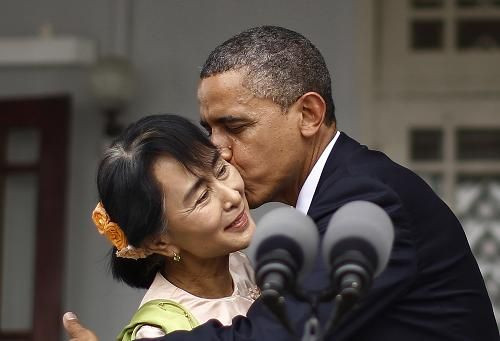Obama, Suu Kyi And The Forbidden Kiss

As Barack Obama appeared in the home of Myanmar pro-democracy activist Aung San Suu Kyi in Yangon, the U.S. president planted a platonic, but very affectionate, kiss on her cheek (to which she appeared to slightly recoil in embarrassment). This act has surprisingly elicited little or no comment in the global press thus far – quite unusual since public displays of affection represent a grave breach of custom in virtually all Asian countries.
Obama likely did not mean to offend his Burmese hosts, however, as a well-travelled man of the world, he must have known that a kiss – especially one between a man and a woman who are not married; and one delivered to the most famous woman in Southeast Asia – violates local etiquette.
In nearby India, for example, public kissing remains a serious taboo (until recently, even in movies), although young urban couples are increasingly ignoring age-old practices.
Historically, public kissing by couples (married or otherwise) has prompted violent reprimands, even arrest by police.
Not even celebrities are spared.
In April 2007, a U.S. film actor, Richard Gere, sparked fury across India when he planted a big kiss on Bollywood actress Shilpa Shetty during a public appearance in New Delhi.
While Shetty downplayed the smooch, Hindu hard-liners burnt effigies of the Hollywood star, citing that Gere’s "vulgar" behavior "insulted" Indian culture and traditions. Some extremists even called for the perpetrators to be arrested on charges of "obscenity."
"It was not so obscene," Shetty told Indian media.
"This was not such a big thing for people to over-react in such a manner. I understand people's sentiments, but I don't want a foreigner to take bad memories from here. I understand this is his [Gere’s] culture, not ours.”
In the early 1990s, another prominent foreigner, South African icon Nelson Mandela, outraged many in India when he kissed actress Shabana Azmi.
Some conservative Indians believe public kissing – like dating and Valentine’s Day – represent the vulgar aspects swamping Indian culture as the nation’s prosperity grows.
Even some Indians who live in the West oppose public kissing.
An Indian named Samir Mody living in the UK wrote to BBC: “The issue is not kissing. The issue is kissing in public. Indians prefer to practice their demonstrations of affection within the confines of their own privacy. I do not see why the public needs to endure the sight of two people exchanging saliva."
Another Indian named Praveen in Canada commented: “Kissing in public considered as uncomfortable to others in India not in private. Because we are not used to that, at least for centuries.”
Other Asian countries similarly frown on public kissing.
In Malaysia a few years ago, the nation’s highest court decreed that foreign tourists could hold hands and kiss in public (as long as it was not “too passionate”) but not local people.
Public demonstrations of affection are also anathema in China, Japan and South Korea.
As for Burma, a travel guide warns: “Showing affection in public such as kissing and hugging is not an acceptable custom in Myanmar. It is recommended that you refrain from kissing and hugging in public.”
Obama’s kissing Suu Kyi may generate some comments later – at the moment, however, the Burmese people are likely more invigorated by the first-ever visit by an American President to their long-isolated country.
Michael Aung-Thwin, professor of Asian Studies at the University of Hawaii, commented: “[Public kissing] is not at all the custom [in Myanmar] as it is here in Hawaii, and [Suu Kyi’s] backing away is almost instinctive for most Burmese women, even those brought up in or have lived a long time in the West.”
Aung-Thwin indicated that kissing is far from being acceptable in public, nor is holding hands.
“The latter might be OK amongst the younger and more-or-less Westernized, urban youth -- but even for them, kissing in public is unacceptable.”
But he adds that Obama’s apparent gaffe likely won’t cause offense among the Burmese public.
“They realize that's the custom here [in the States] and that he's a foreigner, not simply because he's head of state of the U.S. They'll allow such concessions to any foreigner who simply doesn't understand [local customs].”
With respect to Suu Kyi’s apparent ‘backing away’ from Obama’s kiss, another expert on Burma, Frederic K. Lehman, Professor Emeritus at the University of Illinois, speculated: “if, indeed, she did back away, possibly it is a personal thing with her and maybe she may have felt it was not to be done in a Burmese context-- she is, after all, a politician and sensitive to how her constituents may feel about her behavior.”
Though the kiss has elicited no diplomatic incidents, Obama did make at least one other blunder during his informal meeting with Suu Kyi.
The Associated Press reported that Obama repeatedly mispronounced her name, though Suu Kyi politely refrained from correcting him.
The president called the Nobel laureate “Aung Yan Suu Kyi,” versus the correct pronunciation: “Ahng Sahn Soo Chee.”
Nile Gardiner, a Washington-based foreign affairs analyst for the Daily Telegraph, commented: “It is rather embarrassing, as well as sad, that the leader of the free world can’t even pronounce the name of the most famous human rights activist on the planet.”
© Copyright IBTimes 2024. All rights reserved.





















